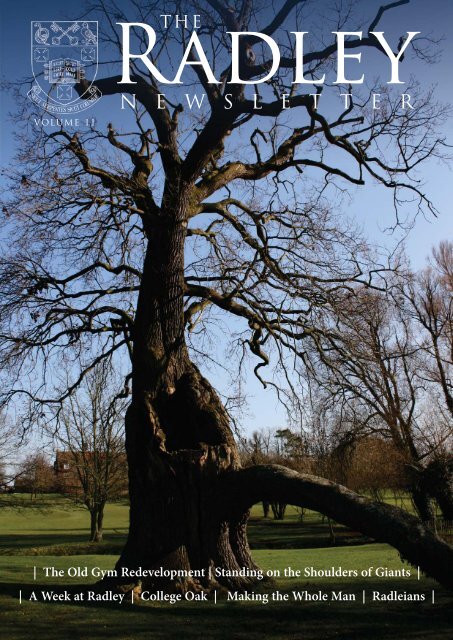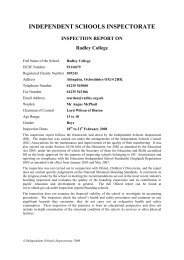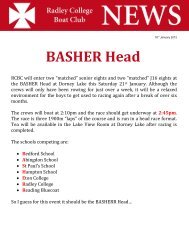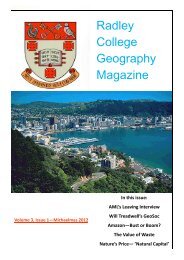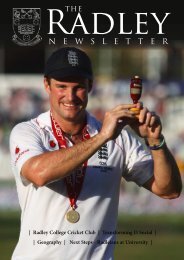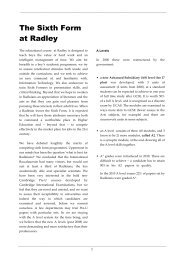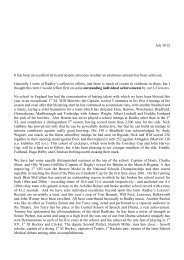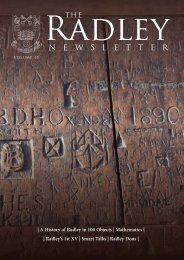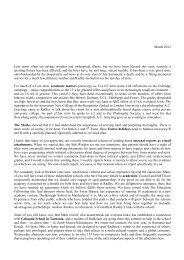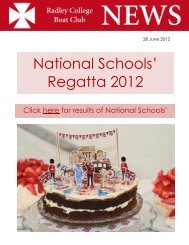N E W S L E T T E R - Radley College
N E W S L E T T E R - Radley College
N E W S L E T T E R - Radley College
Create successful ePaper yourself
Turn your PDF publications into a flip-book with our unique Google optimized e-Paper software.
<strong>Radley</strong><br />
THE<br />
N E W S L E T T E R<br />
VOLUME 11<br />
| The Old Gym Redevelopment | Standing on the Shoulders of Giants |<br />
| A Week at <strong>Radley</strong> | <strong>College</strong> Oak | Making the Whole Man | Radleians |
THE OLD GYM<br />
The unimaginative title of this piece<br />
reflects both the antiquity of the site<br />
of <strong>Radley</strong>’s newest building project<br />
and the fact that it has not one but a<br />
number of functions, none of which<br />
is so overridingly important as to<br />
lay claim to its renaming. So the<br />
new building is not just the History<br />
Department, or the Art Gallery,<br />
or the Coffee Shop, but it is all of<br />
these, married together in a stunning<br />
concept – by the winners of our<br />
competition the architects, Design<br />
Engine. It is important to emphasise<br />
at the outset that we still await<br />
planning permission before Easter,<br />
but provided the planners’ dangerous<br />
shoals are successfully navigated this<br />
spring, we envisage getting underway<br />
with clearing the site in the high<br />
summer, with building commencing<br />
in the autumn. Realistically, we aim<br />
to be in by Easter 2013.<br />
That 60 to 70 weeks of building<br />
reflects the scale of this project.<br />
First it incorporates 10 new<br />
History (and Politics) classrooms,<br />
with accompanying offices, to<br />
accommodate one of the biggest<br />
departments in the school; over<br />
130 boys take A level History, at<br />
present inadequately accommodated<br />
in a few beautiful old classrooms<br />
facing Bigside. Secondly, and at the<br />
building’s heart, is a Coffee Shop and<br />
Social Centre for senior boys, and<br />
their guests, and parents and visitors<br />
to sit in comfort, have a snack, and<br />
talk. We felt this need especially for<br />
weekends; as a full boarding school<br />
it is important to have a stylish<br />
social space for boys, visiting girls<br />
and adults to meet, especially on<br />
Saturdays and Sundays, and the<br />
design has imaginatively satisfied<br />
that need, additionally providing<br />
meeting rooms for more formal<br />
discourse. These social areas flow<br />
easily into the third element, the<br />
expanded Art gallery spaces, for we<br />
have long wanted to provide our Art<br />
2 THE RADLEY NEWSLETTER<br />
2 THE RADLEY NEWSLETTER
REDEVELOPMENT<br />
department and the beautiful, high<br />
quality Art emanating from it, with<br />
exhibition spaces which do justice<br />
to <strong>Radley</strong>’s artistic productivity. The<br />
Art will be both wrapped round<br />
the social spaces, and have discrete<br />
galleries of its own. Design, too,<br />
benefits from extended workshop<br />
and exhibition spaces.<br />
As a whole, this great new building<br />
will make a powerful statement in<br />
the heart of the <strong>College</strong>. There may<br />
have been some residual affection<br />
for the corrugated construction<br />
which morphed from 19th century<br />
chapel into Gym, then into <strong>Radley</strong>’s<br />
theatre space, but the shell has long<br />
since lost its usefulness, the new<br />
theatre superseding it in 2005. Now,<br />
an exciting new concept, enhancing<br />
the Rackets Court and setting off<br />
Clock Tower, will radically transform<br />
the centre of <strong>Radley</strong> <strong>College</strong> for the<br />
better.<br />
THE RADLEY NEWSLETTER 3<br />
THE RADLEY NEWSLETTER 3
Standing o<br />
Shoulders<br />
This is only the second full year of the ‘Standing on the Shoulders of Giants’<br />
Sixth-form Lecture, Seminar and Research Project Programme – yet already<br />
it seems difficult to imagine sixth-form life without what is now known<br />
affectionately as ‘SOTSOG’.<br />
What is SOTSOG? Every academic<br />
cycle, in the first half of the<br />
academic year, the entire 6.1 yeargroup<br />
attends a Lecture period in<br />
the Theatre. Two different dons<br />
have roughly twenty minutes each<br />
to inspire their audiences on topics<br />
and issues central to sixth-form<br />
intellectual life and indeed to the<br />
issues of university study that lie<br />
ahead. Subjects like The Whig View<br />
of History, Revolution in Science, The<br />
Ethics of Terrorism, Marxism and<br />
Feminism, the Nature versus Nurture<br />
debate and many others have been<br />
covered – with the use of powerful<br />
film and audio clips to help bring<br />
these issues alive.<br />
These lectures have proved a<br />
show-case for Common Room to<br />
demonstrate their intellectual talents<br />
and inspire the boys. As someone<br />
lucky enough to have seen all of<br />
the lectures thus far, I can testify<br />
that the standards of presentation<br />
and content have been exceptional.<br />
Lectures that seem to have especially<br />
gripped the sixth-formers over the<br />
past few months have included<br />
Alex Hawkins (Music) and Charlie<br />
Barker (Modern Languages and<br />
Senior Master) on Race in the<br />
Cinema and in Music and Ed Tolputt<br />
(Physics) and Anthony Williams<br />
(Music) on those contrasting<br />
European Geniuses, Alan Turing<br />
and Beethoven. Another highlight<br />
was Ian Yorston’s (IT) lecture on the<br />
emergence of the Big Brother state<br />
in Britain – which was not only full<br />
of impact, it also proved particularly<br />
timely, as it coincided with the 6.2/<br />
St Helen’s Conference focusing on<br />
these selfsame issues in November<br />
2010.<br />
After each lecture, the lecturers’<br />
slides are sent out to the yeargroup,<br />
so boys have a record of the<br />
material covered. They are also<br />
given a Course booklet, containing<br />
summary notes on each topic from<br />
each of the Lecturers, together with<br />
follow-up reading and research<br />
suggestions, guiding them on the<br />
next steps once their interest is<br />
sparked.<br />
The second SOTSOG period each<br />
academic cycle is taken up with a<br />
university-style Seminar, where boys<br />
meet with their Seminar leader, in<br />
small groups of around a dozen, to<br />
discuss issues that have interested<br />
them in the lectures. Discussions<br />
have been full, frank and often<br />
stimulating.<br />
Such intellectual stimulation over<br />
and above their mainstream A level<br />
subjects is of course an educational<br />
end in itself. It can be hugely helpful<br />
in A level classes, for example, to<br />
be able to reference names like Sir<br />
Isaac Newton (who himself used<br />
the ‘standing on the shoulders of<br />
giants’ analogy to describe his own<br />
investigations), Nietzsche and Marx,<br />
safe in the knowledge that sixthformers<br />
will have an understanding<br />
of the enormous legacy of such key<br />
figures from their SOTSOG lectures.<br />
But SOTSOG doesn’t end there. In<br />
the second part of the 6.1 year, the<br />
interest triggered by these lectures<br />
and seminars is followed up with<br />
the third and final part of the<br />
Programme: the undertaking of<br />
a research project. There are two<br />
types of research project; every sixth<br />
former chooses one of them. The<br />
simplest is the internally-marked<br />
2,000 word ‘<strong>Radley</strong> Project’ – on<br />
any of the titles suggested by the 34<br />
individual lectures they have heard.<br />
A stimulating question is posed –<br />
for example, Can or should Art be<br />
dangerous? – then explored in the<br />
research essay.<br />
Even this comparatively short<br />
Project carries strong research<br />
and independent learning<br />
benefits – precisely the kind of<br />
skills universities are increasingly<br />
valuing, as places become evermore<br />
competitive. Will a university<br />
applicant be capable of working<br />
independently without close<br />
supervision? Is he likely to drop<br />
out, unable to complete the rigours<br />
of the course? Having completed a<br />
research project at <strong>Radley</strong>, all the<br />
evidence points to success - and,<br />
as we’ve already seen in our UCAS<br />
application cycle this year, those<br />
boys, the majority, undertaking<br />
the <strong>Radley</strong> Project, have been<br />
highlighting its benefits in their<br />
UCAS ‘Personal Statements’.<br />
And for the even more academically<br />
ambitious and organised there is<br />
the demanding externally-assessed<br />
project – the Edexcel Extended<br />
Project - worth half an A level.<br />
This is by no means an easy option,<br />
requiring a great deal of planning<br />
and organisational skill, with for<br />
example, around 20-25 research<br />
4 THE RADLEY NEWSLETTER
n the<br />
of Giants<br />
sources needing to be consulted<br />
and incorporated into a final<br />
dissertation. That said, the benefits<br />
to any applicant aiming for a top<br />
university are clear to see. If a<br />
Radleian can successfully, on top<br />
of taking four A levels, complete<br />
a 7,000 word research project,<br />
then without question, he is likely<br />
to prove a very strong candidate<br />
indeed for university study.<br />
This year around 35 completed<br />
projects will be submitted to<br />
Edexcel from our current 6.2s<br />
(who did most of the research for<br />
these Projects in their 6.1 year).<br />
We await the results with interest.<br />
What has been particularly pleasing<br />
is that not only has there been<br />
some exceptional work at the ‘top<br />
end’ – with outstanding original<br />
research written on topics like<br />
Climate Change, Middle Eastern<br />
Politics, Sport Science, Feminism<br />
in Literature – some boys who<br />
may not necessarily seem natural<br />
academic high-flyers have also<br />
successfully produced original<br />
and high-quality research,<br />
again motivated purely by<br />
their own personal interest and<br />
determination.<br />
This sense of seeking to spark and<br />
inspire is of course the very cornerstone<br />
of the SOTSOG course.<br />
And whatever else it may achieve,<br />
SOTSOG seems to be encouraging<br />
a significant number of boys to<br />
be more academically ambitious<br />
– at the same time giving them<br />
a taste of the research skills that<br />
will be needed once they arrive at<br />
university.<br />
None of this could have been<br />
possible without the enthusiasm of<br />
Common Room. A clear majority,<br />
over fifty, of all dons have been<br />
voluntarily involved with SOTSOG<br />
in some form or another – whether<br />
as Lecturers, Seminar Leaders or<br />
Research Project Supervisors. It is<br />
interesting to note that a number<br />
of schools are currently looking<br />
at the idea of research projects<br />
and independent learning skills,<br />
as a means of supplementing their<br />
sixth-form curriculum in these<br />
increasingly competitive times.<br />
Very few will be able to call upon<br />
the talents <strong>Radley</strong> has been able to<br />
muster from its Common Room.<br />
Dr Andrew Cunningham<br />
THE RADLEY NEWSLETTER 5<br />
THE RADLEY NEWSLETTER 5
A WEEK A<br />
WEEK 8 CYCLE 15<br />
Sunday, March 6<br />
The Sunday next before Lent<br />
CCF Field Weekend<br />
Rugby Sevens: Windsor RFC<br />
10.00 Service for Lent, Preb. Charles Marnham, The Lent Visitor<br />
11.00 ‘The History Boys’ Technical (Theatre)<br />
____________________________________________________________________<br />
Monday, March 7 Day 5<br />
Matthew 7:13-23<br />
CCF Field Day<br />
C Social Duty Week<br />
8.30 6.2 to AER (SLT)<br />
8.45 6.2 Study Day begins<br />
9.20 - 10.00 6.1 Lecture: ‘Research Skills’ (CDS/AC)<br />
____________________________________________________________________<br />
Tuesday, March 8 Day 6<br />
Matthew 7:24-29<br />
Art Scholarship<br />
A level Mocks begin<br />
8.00 - 4.30 U14 South regional hockey heats<br />
1.00-6.00 Art AS Exam<br />
1.15 Coffee Concert: Instrumentalists and Singers (Silk Hall)<br />
____________________________________________________________________<br />
Wednesday, March 9 Day 7<br />
Isaiah 58:1-8<br />
Ash Wednesday<br />
Academic Scholarship<br />
8.00 Ash Wednesday Roman Catholic Mass<br />
8.45 Ash Wednesday Service (Chapel)<br />
9.20 Period 2<br />
____________________________________________________________________<br />
Thursday, March 10 Day 8<br />
John 13:1-11<br />
Academic Scholarship<br />
Departmental Outings<br />
8.00 - 4.30 U16 South regional hockey heats<br />
8.30 - 6.00 Fifths: Art Trip to London<br />
8.30 - 6.00 6.1 Geology fieldtrip to Aust Cliff<br />
8.30 - 6.00 6.1 Geography Energy field trip<br />
1.00 6.1, Remove, Shell Interim Reports deadline (CR)<br />
____________________________________________________________________<br />
Friday, March 11 Day 1<br />
John 13:12-17<br />
All Rounder Scholarship<br />
____________________________________________________________________<br />
Saturday, March 12 Day 2<br />
John 13:18-30<br />
8.00 Sailing Match: NSSA 2 boat team racing (Farmoor)<br />
9.00 - 4.00 Rowing: Reading University Head<br />
9.30 Council (<strong>Radley</strong>)<br />
6 THE RADLEY NEWSLETTER
RADLEY<br />
11.00 - 5.00 Art GCSE Remove Exam<br />
11.15 - 12.30 Cricket: Academy Squad Training<br />
11.30 - 4.30 Choral Society Rehearsal Day 1 - (Silk Hall) Lunch in Hall<br />
2.00 Shell Golf v Summer Fields (H)<br />
____________________________________________________________________<br />
2.40 Warden’s Spelling Test: Shells<br />
4.30 CCF/Wednesday Activities<br />
6.00 ‘The History Boys’ Dress Rehearsal (Theatre)<br />
No Chapel<br />
9.05 Hudson Society<br />
9.05 Vth Form Society<br />
9.05 Crowson Society<br />
9.05 Lent Address (New Pavilion)<br />
9.05 Upper Sixth<br />
10.00 6.1 Interim Reports deadline (Boys)<br />
____________________________________________________________________<br />
Academic Scholarship (from 3.30pm)<br />
2.00-9.00 Music GCSE/A Level Composition Workshop: Bingham<br />
String Quartet - Removes and 6.1 (Silk Hall)<br />
5.15 Shell 1 Guides for Scholarship (until Thursday)<br />
6.00 ‘The History Boys’ Dress Rehearsal (Theatre)<br />
9.05-10.00 Inter-Social Debating Competition - Sixth Form: Round 1<br />
(SLT)<br />
9.05 Lent Address (New Pavilion)<br />
____________________________________________________________________<br />
4.30 Games<br />
6.30 D of E Gold Spotlight<br />
6.45 English Dept Shell 1 and Lit Soc theatre trip: ‘The Tempest’<br />
(Oxford Playhouse)<br />
8.30 Keyboard Krazy Koncert (Silk Hall)<br />
9.05-10.00 Inter-Social Debating Competition - Sixth Form: Round 1<br />
(SLT)<br />
9.05 Lent Address (New Pavilion)<br />
____________________________________________________________________<br />
APT for 6.1 (no priority)<br />
Rackets v Clifton (H)<br />
12.05-7.45 Golf v ORs (at The Berkshire)<br />
12.40-7.00 Fives v Malvern (H) U14 A&B<br />
2.00-6.00 Squash v Abingdon (H)<br />
7.45 ‘The History Boys’ (Theatre)<br />
9.05-10.00 Inter-Social Debating Competition - Sixth Form: Round 1<br />
(New Pavilion)<br />
____________________________________________________________________<br />
1.30 Form Masters’ Period: 6.1, R, S Reports<br />
4.00 Council (<strong>Radley</strong>)<br />
7.45-9.45 Choral Society Evening Rehearsal 2 (Silk Hall)<br />
7.45 ‘The History Boys’ (Theatre) - Council attending<br />
____________________________________________________________________<br />
12.00-6.00 Cross Country SE Championships (Harrow)<br />
Hockey v Charterhouse 3, C1-3, JC1-4 (H);<br />
1,2,4,5, M1-6 (A) lunch12:00, leave 12:20<br />
Soccer v Haberdashers Aske’s 1-3 (H); C1-2 (A) leave 12:00<br />
Soccer v Oratory C3, JC3 (H)<br />
2.00 D of E Bronze Expedition departs<br />
Fifths Dance with Westonbirt (H)<br />
7.45 J Social Culture Evening (Silk Hall)<br />
THE RADLEY NEWSLETTER 7
<strong>College</strong> Oak<br />
8 THE RADLEY NEWSLETTER
Every Wednesday evening Radleians congregate in their boarding houses for ‘Social Prayers’. Talks are given<br />
by dons which may have a moral or spiritual element, often they relate to events in the news, but sometimes<br />
they simply inform the boys about interesting ideas and facts which might not otherwise find their way into a<br />
curriculum. This is an address given by the Acting Warden, Andrew Reekes:<br />
Standing at the bottom of a broad track, alongside<br />
Capability Brown’s picturesque lake, is a gnarled<br />
and twisted oak tree of considerable girth and<br />
obvious antiquity. Since <strong>Radley</strong>’s early days it has<br />
been known as <strong>College</strong> Oak, but <strong>Radley</strong> <strong>College</strong><br />
is a Johnny-come-lately when set alongside this<br />
noble tree, which dendrochronologists from the<br />
EU have recently dated as being c.1060 years<br />
old. In truth, it is one of the oldest extant trees<br />
anywhere in Europe.<br />
Pigs foraging for pannage through the forests<br />
attached to Abingdon Abbey evidently missed a<br />
stray nut. It took root at a time when Edgar the<br />
Peacable, from Wessex, was King of England and<br />
St Aethelwold the Bishop of Winchester held the<br />
Abbacy at Abingdon and so owned the woods.<br />
The tree was already a century old when William<br />
of Normandy conquered England; he came to<br />
Abingdon in 1084 to celebrate Easter, hunted<br />
boar across <strong>Radley</strong> land and left his son, later<br />
to be Henry 1st, to board at the Abbey. <strong>College</strong><br />
Oak grew and flourished through the Angevin<br />
and Plantagent centuries, one of scores of such<br />
trees in these parts. A layman here would have<br />
been trespassing and it is likely that only boar<br />
and deer sheltered under its boughs; perhaps the<br />
occasional courting couple romped in its leafy<br />
shelter.<br />
At some stage, centuries ago, a lightening strike<br />
or a natural deformity led to a strange perversion<br />
which makes <strong>College</strong> Oak unique; its 60 foot<br />
long sideshoot, as thick as a child is high, lying<br />
parallel to the ground and rooting in the soil in<br />
its own right. It probably explains why the tree is<br />
here today. With Henry VIII came a passionate,<br />
competitive, dynastic desire to make a mark in<br />
Europe and war inevitably meant the need to<br />
defend these shores with a strong navy. Henry<br />
ordered the building of huge oak men-of-war of<br />
which the Mary Rose was one example. Because<br />
of its size, and height, and the design of is<br />
gunports it shipped water and turned turtle one<br />
benign summer’s day on the Solent. Surveyors<br />
then, as in the time of his daughter Elizabeth,<br />
scoured the south of England for thick, tall,<br />
straight oak timber. <strong>Radley</strong>’s was even then too<br />
old, too bent, to pass muster. As in the late 18th<br />
century when the Admiralty looked for English<br />
oak to construct a navy against Bourbon, then<br />
Revolutionary, finally Napoleonic, France,<br />
<strong>College</strong> Oak survived the cull.<br />
By then, too, something else had happened to it.<br />
It had been incorporated into the leisure industry<br />
of its era. Capability Brown, the greatest garden<br />
designer of his era, architect of over 140 such<br />
schemes, was employed here to landscape the<br />
grounds surrounding newish <strong>Radley</strong> Hall on<br />
lands freed, after Henry VIII’s dissolution, from<br />
ecclesiastical ownership. Capability Brown’s<br />
style was one of smooth, undulating grass<br />
accompanied by artistically devised clumps and<br />
softening of trees, with serpentine lakes, all with<br />
the aim of creating the gardenless garden. <strong>College</strong><br />
Oak was a picturesque prop in an 18th century<br />
stage set, part of a contrived landscape in the style<br />
of Claude Lorraine.<br />
Its final incarnation, now 900 years old, was to<br />
act as bit part player in the new <strong>Radley</strong> <strong>College</strong>,<br />
founded in 1847. So hungry were early Radleians<br />
that they foraged like those Anglo-Saxon wild<br />
boar of old, for acorns from <strong>College</strong> Oak; they hid<br />
tuck from prying authorities in its hollow interior.<br />
At some stage – not, of course, now – it was also<br />
the secret repository of illicit cigarettes and the<br />
occasional bottles of hooch. By the 21st century<br />
it was, indeed, a hollowed-out oak, a hoary old<br />
growth, but it still had life, and survived the<br />
attentions of tree surgeons round the grounds in<br />
the last decade.<br />
So, it is rather humbling to review what it has<br />
outlived. It was 100 years old when the Normans<br />
came, 400 years old when England’s population<br />
was halved by Black Death, 600 years old when<br />
Shakespeare was born, 700 years old when<br />
Royalists and Parliamentarians surged to and<br />
fro across <strong>Radley</strong>’s lands as they contested the<br />
Thames Valley and Royalist Oxford; 850 years old<br />
when beacons were lit across Southern England to<br />
warn of impending invasion by Napoleon in 1805;<br />
the tree celebrated its millennium as Radleians<br />
and Eastbournians (evacuated here for the war’s<br />
duration) gazed skywards at German bombers<br />
passing north overhead to seek out Birmingham<br />
and Coventry. It is quite extraordinary that a<br />
living thing could have survived so much – over<br />
1000 years – of our island history. That survival<br />
perfectly illustrates why we revere the oak tree<br />
– its resilience, strength and durability has long<br />
symbolised those enduring rugged, yeoman<br />
qualities of the idealised Englishman.<br />
THE RADLEY NEWSLETTER 9<br />
THE RADLEY NEWSLETTER 9
Making the<br />
Whole Man<br />
Some schools are obsessed with academic league tables; some worship at the shrine of sport; some<br />
pay lip-service to the spiritual traditions of their foundations. <strong>Radley</strong> aims to educate the whole<br />
person. One of the advantages of the boarding environment is that the dons and boys are living<br />
in a community. Thus the values and skills which are essential to build a successful and caring<br />
society can be nurtured in an effective and authentic manner.<br />
Successive governments have identified<br />
the erosion of social, moral and personal<br />
values as weakening the fabric of society.<br />
The response was to develop as a part of the<br />
National Curriculum subjects called PSHE<br />
(Personal, Social and Health Education) and<br />
Citizenship . More recently the National<br />
Healthy Schools Programme was established<br />
as a joint initiative by the Department of<br />
Health and the Department for Education<br />
and Skills (DfES) to reduce health<br />
inequalities. Healthy Schools, as envisaged<br />
for the maintained sector, advocates a<br />
whole school approach to PSHE, involving<br />
pupils, the leadership team, governors and<br />
the relevant parts of the local community.<br />
The most innovative method of delivering<br />
PSHE recommended by Healthy Schools is<br />
the ‘normative’ or social norms approach<br />
rather than the negative approach to such<br />
issues which polarizes attitudes and can<br />
even make illicit or unhealthy behaviour<br />
more appealing to a rebellious teenager. This<br />
model fits well with <strong>Radley</strong>’s ethos.<br />
To promote this normative approach, PSHE<br />
and Citizenship are integrated into all<br />
aspects of life at <strong>Radley</strong>; classroom teaching,<br />
tutor groups, socials, and games. The<br />
development of the whole person is central<br />
to <strong>Radley</strong>’s education. As <strong>Radley</strong> is also a<br />
religious and charitable institution its culture<br />
promotes a spirit of responsible and selfless<br />
giving in its staff and pupils.<br />
The more obvious aspects of PSHE: healthy<br />
diet, alcohol, smoking and drugs awareness,<br />
and sexual health are taught, in the main,<br />
within the Biology curriculum, but these<br />
are supported by talks from medical staff,<br />
external specialists and developed further<br />
in small Social-based discussion groups by<br />
boys’ form-masters.<br />
We have been very lucky to establish a<br />
large and reliable network of excellent<br />
guest speakers who have fully endorsed our<br />
approach. For example, the Shells receive<br />
very different talks from Alex Corkran<br />
and Kaz Ghalmi on issues of self-esteem,<br />
eating disorders and awareness of peer<br />
pressure. Alex Corkran comments that she<br />
finds Radleians a pleasure to speak to, as<br />
they listen intently. She is impressed greatly<br />
by the questions they ask and by their<br />
willingness to approach her afterwards with<br />
more questions, or just to say thank you.<br />
“What a fabulous group of young people<br />
they are!” she told me after giving her last<br />
talk. Kaz Ghalmi is a former drug addict and<br />
a specialist in professional drugs-awareness<br />
training. He was recommended to us by<br />
Thames Valley Police and, having lived in<br />
<strong>Radley</strong> village, he knows our situation well.<br />
He is a very amusing speaker who manages<br />
to get the boys in the Shells to think about<br />
their attitudes towards one another. He<br />
and another drugs worker run workshops<br />
with small groups in the Vth form. In these<br />
they address in more depth any questions<br />
about drugs and alcohol abuse. Another<br />
local specialist in this field is Mark Stevens,<br />
the clinical psychiatric nursing manager<br />
for Oxfordshire and Buckinghamshire<br />
Community Addiction Services. He comes<br />
in weekly for the first half of the Michaelmas<br />
Term to speak to a couple of form groups<br />
at a time about drugs and alcohol abuse.<br />
Both he and Kaz Ghalmi also give talks<br />
to Common Room and to parents to<br />
complement their work with the boys. These<br />
sessions have always proved very popular<br />
and are strategically important in keeping all<br />
those looking after boys fully informed.<br />
A number of Old Radleians have generously<br />
given talks to our boys. About eight years<br />
ago, I went to a dinner talk on Addiction<br />
given at Brooks’s Club by Lord Birdwood. He<br />
10 THE RADLEY NEWSLETTER
gave such an entertaining and compelling<br />
insight into his own life experience as<br />
an alcoholic that I was delighted that he<br />
has been able to return to <strong>Radley</strong> each<br />
year to speak to the 6.1 year group. He<br />
comments, “The reaction of the audience<br />
of older boys is everything one could<br />
hope for. From the beginning, they are<br />
engaged, clearly identifying with the<br />
pitfalls which I am describing. There is<br />
real identification. Mind you, the topic<br />
- addiction in general, and alcohol in<br />
particular - is likely to ring bells as most<br />
families have a problem somewhere in<br />
their spread. I focus particularly on AA<br />
(Alcoholics Anonymous).” He reports that<br />
he received some feedback unexpectedly<br />
in Brooks’s one evening when a Radleian’s<br />
father said, out of the blue, that his son<br />
had raved about the talk and how much of<br />
an eye-opener it had been and stimulated<br />
discussion amongst his friends afterwards.<br />
Perhaps a few ORs have memories of<br />
watching scratchy black and white films<br />
on How babies are made, or The dangers<br />
of venereal disease. We have an old 16mm<br />
film reel sitting on the shelf in Biology<br />
entitled Human Reproduction but (un)<br />
fortunately no projector with which to view<br />
it. Things have advanced a lot. As well as<br />
excellent materials from Channel 4 and<br />
BBC Education, Prof Robert Winston’s<br />
acclaimed Human Body series provides<br />
a superb set of programmes covering<br />
puberty and pregnancy. Using models,<br />
condoms and other contraceptives, the<br />
Biology Department and Medical Centre<br />
provide guidance on contraception and<br />
sexually transmitted infections with special<br />
emphasis on Chlamydia: a particularly<br />
nasty, but often symptomless, bacterial<br />
infection which is currently spreading<br />
through the UK’s teenage population at an<br />
alarming rate.<br />
The context of all PSHE and Citizenship<br />
is always considered in light of <strong>Radley</strong>’s<br />
identity as a Christian school. Over their<br />
time here, boys need to develop a mature<br />
emotional and spiritual self-awareness to<br />
help them cope with the psychological<br />
and moral challenges which they will<br />
undoubtedly meet throughout their lives.<br />
An awareness of the effects of depression<br />
and anxiety on oneself, family and friends<br />
has been acutely brought to the Radleian<br />
consciousness through the work of the<br />
Charlie Waller Memorial Trust and Alex<br />
Corkran’s talks.<br />
Another remarkable expression of<br />
Radleians’ generosity of spirit is<br />
exemplified by the sustained and diverse<br />
range of fund-raising activities for so many<br />
different charities, often with very personal<br />
links to boys in the school. These activities<br />
range from individual endurance record<br />
attempts and sponsored long-distance<br />
cycle or rowing events, to whole-school<br />
charity dress-down days and selling special<br />
<strong>Radley</strong>-branded novelties such as pyjamas<br />
or boxer shorts. Many thousands of pounds<br />
are raised annually through the boys’<br />
ingenuity and resourcefulness.<br />
It should not come as any surprise that<br />
the spiritual barometer of the school is the<br />
atmosphere in Chapel. The school chapel is<br />
a special place, a holy place: the generations<br />
of past pupils who return and visit to pray<br />
and reminisce in silence or at services<br />
are a testimony to its power. It forms and<br />
confirms Christians on their discipleship<br />
journey. For some it begins as a routine<br />
chore, for others it seems irrelevant at first,<br />
but it soon becomes a spiritual refuge and<br />
refectory. Very few schools still have a daily<br />
chapel service for the entire school, or even<br />
the principle of a weekly Sunday Eucharist.<br />
When I arrived at <strong>Radley</strong> in 1997, I was<br />
struck by Chapel’s peaceful atmosphere<br />
and the stillness maintained by the whole<br />
congregation in the five minutes before<br />
weekday Evensongs and during prayers and<br />
the taking of Communion.<br />
THE RADLEY NEWSLETTER 11<br />
THE RADLEY NEWSLETTER 11
adleians<br />
The voluntary candlelit Eucharists on<br />
Friday evenings would gather thirty or<br />
more boys together in prayer to receive<br />
the Blessed Sacrament. This term the<br />
Chaplain has introduced a short said<br />
Eucharist after lunch on Wednesdays.<br />
Having had the privilege of preparing<br />
boys for Confirmation, I am acutely<br />
aware of how embarrassing they find<br />
it to talk openly in groups about their<br />
spiritual journeys as opposed to other<br />
PSHE topics, their favourite team’s<br />
performance, or which film star they<br />
fancy most. However, individually,<br />
they all relate different, but no less<br />
real experiences of fear, inadequacy,<br />
joy, and hope which are healed and<br />
nurtured in Chapel, where they are<br />
reminded that they are not just pupils,<br />
but the living Body of Christ.<br />
I will never forget the sight of hundreds<br />
and hundreds of candles being lit on<br />
the Altar at the voluntary evening<br />
service the Revd Tim Fernyhough<br />
and I led in response to the 2004<br />
Boxing Day Tsunami. In those<br />
precious minutes boys were not too<br />
embarrassed to cry, to pray fervently,<br />
to thank God and to struggle with<br />
the tragedy of natural disasters. It was<br />
perhaps the most overt expression of<br />
a school’s corporate Christian faith<br />
I have experienced for many years:<br />
quiet, candlelit, prayerful and dignified<br />
liturgy followed by the most rousing<br />
hymn-singing.<br />
It is not just the boys who are nurtured<br />
by <strong>Radley</strong>’s spiritual tradition. In my<br />
time here the Holy Spirit has been<br />
hard at work in Common Room:<br />
Katie Jones, James Wesson, Matthew<br />
Bemand, Brenda Stewart, Rebecca<br />
Peters and I have all been ordained<br />
priests, and two more <strong>Radley</strong> dons<br />
are currently exploring this calling.<br />
Before my own ordination training,<br />
I would lead a simple said Compline<br />
on Wednesday evenings in the Chapel<br />
of the Resurrection above Memorial<br />
Arch. This was always supported by<br />
the dedicated team of Sacristans, one<br />
of whom is himself now following his<br />
own vocation. Boys and dons alike can<br />
become whole people at <strong>Radley</strong>.<br />
The Revd Dr Simon Thorn<br />
Head of Science and PSHE<br />
Vannevar Taylor (VI-1)<br />
DRAGON, ETON, K SOCIAL<br />
There is no denying that when I first<br />
set foot on <strong>Radley</strong> soil as a Radleian,<br />
doubts were scurrying around my<br />
head and my heart thumping with<br />
nervousness. I knew of the immense<br />
beauty of the grounds, I knew of its<br />
reputation as an all-round school. I<br />
had captained an Eton side that was<br />
thumped by <strong>Radley</strong> at rugby: their<br />
sporting prowess was no secret to me.<br />
Equally, some of the brightest boys of<br />
my prep school, the Dragon, had gone<br />
on to <strong>Radley</strong>: it was easy to guess that<br />
they were no slouches on the academic<br />
side of things too.<br />
This did not prevent the doubts<br />
from assailing me. I had laboured all<br />
summer-long to catch up on GCSE<br />
syllabuses which differed from those I<br />
had studied at Eton, I was determined<br />
to make this place the right one. I was<br />
prepared for challenges, and therefore<br />
anticipation was normal.<br />
This was reckoning without the<br />
character of the place. From my first<br />
evening at the school, I felt welcome.<br />
Boys went out of their way to be<br />
friendly to me and to make me feel at<br />
home in a way I had not experienced<br />
before. Thanks to this, I settled down<br />
quickly to the <strong>Radley</strong> way of life.<br />
Sport was integral to this, and my<br />
participation as openside flanker to<br />
the Colts 2 unbeaten season in my first<br />
term confirmed my impression of all<br />
Radleians’ dedication to sports. I felt<br />
from the off that it would provide for<br />
me what Eton had not been able to:<br />
a warm, friendly environment where<br />
pleasant and sociable boys were the<br />
rule rather than the exception.<br />
On the academic front, I felt at once<br />
that I was in safe hands. Lessons<br />
were productive and informative and<br />
teachers managed to keep each and<br />
every lesson interesting. However,<br />
the relative informality that existed in<br />
lessons and the friendly relationships<br />
boys struck up with teachers was the<br />
aspect that surprised and impressed<br />
me the most. This kind of relationship<br />
not only contributed to the friendly<br />
atmosphere of the place, but helped<br />
drive the boys to better and higher<br />
achievements, as they tried desperately<br />
not to disappoint the teachers after<br />
their hard work.<br />
Having already been to one of the best<br />
public schools in the business, it would<br />
have been natural for me to have been<br />
critical of aspects that left something<br />
to be desired. This was rendered<br />
impossible by the lack of flaws in the<br />
<strong>Radley</strong> system.<br />
Societies were without exception<br />
stimulating and of profound interest.<br />
Better still, there was no lack of them;<br />
lectures were constantly being given,<br />
either by teachers or experts in all<br />
fields brought in to talk to us. Most<br />
impressively, boys seemed eager to<br />
involve themselves in these extracurricular<br />
opportunities, and many<br />
took a genuine interest in multiple<br />
shades of the spectrum.<br />
Life in socials was another aspect of<br />
<strong>Radley</strong> life that I immediately took to.<br />
K Social, as one of the two new houses,<br />
was easy to like for its cleanliness and<br />
striking interior, but its atmosphere<br />
was something that no other school<br />
could, in my opinion, replicate. Again,<br />
the informality of it all struck me, but<br />
the idea of “cocoa” was one that had<br />
never occurred to me before, and one<br />
that suited the camaraderie present in<br />
all socials.<br />
Having been successfully guided<br />
through GCSEs and having embarked<br />
on the A level course, every aspect of<br />
life in school continues to impress me,<br />
not least the fantastic facilities we have<br />
at our disposal, or the competitiveness<br />
of boys on the games fields, but equally<br />
the friendliness of everybody no matter<br />
what the situation.<br />
I have much to be grateful for at<br />
<strong>Radley</strong> for, particularly the recent<br />
award of an honorary academic<br />
scholarship. I shall always be thankful<br />
for the opportunities it has given, and<br />
continues to give to me, as I make my<br />
way through the sixth form.<br />
12 THE RADLEY NEWSLETTER<br />
12 THE RADLEY NEWSLETTER<br />
Website: www.radley.org.uk . Admissions enquiries: 01235 543174 . admissions@radley.org.uk


